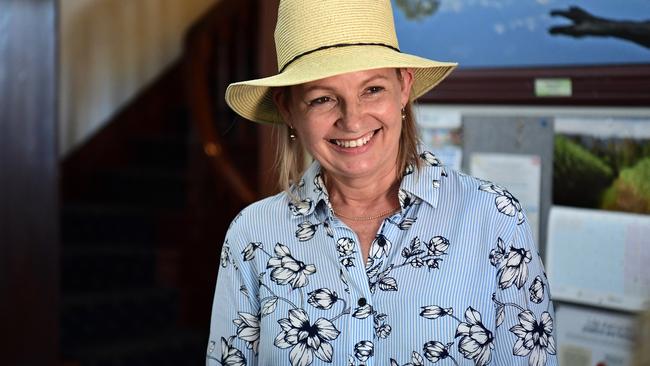Kitchens set for a rubbish revolution
Households around the country would be given a kitchen-scraps bin under a plan to convert rubbish into compost for farmers.

Households around the country would be given a kitchen-scraps bin under a plan being considered by the federal government in which a uniform garbage collection scheme would convert rubbish into compost for farmers.
The would-be revolution of kerbside waste collection could potentially generate thousands of jobs in the regions, cut greenhouse gas emissions and slash the volume of waste sent to landfill.
Environment Minister Sussan Ley said states and local governments had to harmonise waste collection in a bid to meet ambitious targets set by the National Waste Policy Action Plan.
“If you drive from western Sydney to the eastern suburbs, you go through five different bin collection regimes,” she said.
“As far as I’m concerned we really should have one.”
China’s decision to ban waste exports in 2018 exposed weaknesses in Australia’s recycling regime and forced federal, state and local governments to reassess the sustainability of the sector.
Ms Ley is a longtime supporter of the food and garden organics (FOGO) collection system after it was implemented in her NSW hometown of Albury in 2014.
“There is a huge opportunity to have such a win-win,” she said.
“You use the food waste, you turn it into compost, you improve the quality of your soil, you sequester more carbon in that soil … but the most exciting thing I can say as a farmer is you get more productive soil, so you can grow more in the soil that you have.”
Under the FOGO system, households are given compostable bin liners and a caddy to collect kitchen waste including vegetables, meat and fish bones, and dairy products that are then deposited into the green waste bin along with garden waste. The green bin is then collected weekly and taken to an industrial composting centre where it is turned into compost, before being either sold to farmers or consumers at stores.
West Wodonga resident Bec Shellard, 37, said being able to put kitchen and garden waste into her green bin took pressure off the general rubbish bin.
“You know when you mow the lawn, you've got a bin to put all your scraps in (and) food waste all goes into one,” she said.
Households account for about a third of Australia’s food waste, throwing away 3.1 million tonnes of edible food each year.
“There’s probably at least a quarter of the food waste stream between your fridge and your bin and consumers need to act on that, so part of this is consumer education,’’ Ms Ley said.
Waste management company Cleanaway has collected more than 128,000 tonnes of organic material since the program began in 2014 in shires straddling the border districts of Albury-Wodonga.
Branch manager David Collins said each week the company collected the contents of about 60,000 240 litre bins before the waste was transported to a organics recovery and composting centre in Albury.
“We’re proud to say the rate of contamination of FOGO is just 0.34 per cent, which is much lower than average and reflects the passion that households in these areas have for recycling their food and garden material,” he said.
All states and territories have agreed to halve the amount of organic waste sent to landfill by 2030 under the National Waste Action plan, which if achieved would see 2.7 million tonnes less going to landfill each year.
About a third of Australians have access to a FOGO system, with the rate of organics recycling varying across the country.
South Australia is leading the charge with a rate of about 80 per cent, while the Northern Territory manages about 19 per cent, according to the Australian Organics Recycling Association.
Association executive officer Peter Olah said the federal government should introduce incentives to ensure states and territories kept local governments on track to meet their waste targets.
“Unlike some other materials, all organics are recyclable,” he said. “It’s a natural process.”
Mike Ritchie, chief executive of leading environmental consultants MRA Consulting, said the system closes the loop between a regional need, fertiliser and soil improvement, and an urban problem, with kitchen scraps making up about half of household rubbish taken to landfill.
“Those two issues have travelled in parallel for hundreds of years,” he said.



